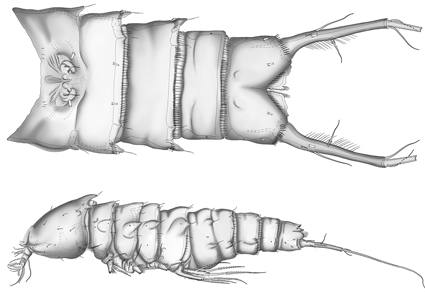Abstract
Seven species of four cletodid genera previously described or reported from Mexico (Cletodes, Enhydrosoma, Geehydrosoma, and Stylicletodes) and an undescribed genus presumably related to Sphingothrix and Triathrix, were found in sediment samples from a coastal system in north-western Mexico. The Bayesian analysis of 95 morphological characters of thirty-four cletodid genera revealed that the new genus, Chalarosthrix gen. nov., is closely related to Sphingothrix. The clade Sphingothrix-Chalarosthrix bears a sister group relationship with Triathrix. These three genera constitute a monophyletic group defined by the presence of a posterior chitinous extension of the cephalothorax with four sensillum-bearing socles, and the presence of a median tube-pore on the anal operculum. Other synapomorphies for Sphingothrix and Triathrix proposed by earlier researchers are re-evaluated upon the latest definition of the Cletodidae. Our analysis supports previous studies in that Sphingothrix can be objectively defined by i) the reduction of the distal outer seta of the last exopodal segment of the first swimming leg being at most as long as the subdistal outer spine, and ii) the distal inner seta of the same segment inclined outwards intersecting the distal outer element at its base. On the other hand, no (aut)apomorphies were detected for Triathrix. The new genus, Chalarosthrix gen. nov., is defined here by the apomorphic secondary loss of the inner element of the second endopodal segment of the first swimming leg. Some comments on the relationships of the new genus are given.
References
Boeck, A. (1872) Nye Slaegter og Arter af Saltvands-Copepoder. Forhandlinger i Videnskabs-Selskabet i Kristiana, 1872, 35–60.
Brady, G.S. (1872) Contributions to the study of the Entomostraca. No. VII. A list of the non-parasitic marine Copepoda of the north-east coast of England. Annals and Magazine of Natural History, 4, 1–17. https://doi.org/10.1080/00222937208696629
Burgess, R. (2001) An improved protocol for separating meiofauna from sediments using colloidal silica sols. Marine Ecology Progress Series, 214, 161–165. https://doi.org/10.3354/meps214161
Conroy-Dalton, S. (2001) Systematics and phylogeny of the Ancorabolidae (Copepoda: Harpacticoida). II. Polyphyly of Polyascophorus and description of Arthuricornua, new genus. Journal of Crustacean Biology, 21, 170–191. https://doi.org/10.1163/20021975-99990115
Conroy-Dalton, S. & Huys, R. (2000) Systematics and phylogeny of the Ancorabolidae (Copepoda: Harpacticoida). I. The Ancorabolus-lineage, with the description of three new genera. Cahiers de Biologie Marine, 41, 343–397. https://doi.org/10.21411/CBM.A.FF9630A7
Fiers, F. (1997) The genera Triathrix Gee & Burgess and Sphingothrix gen. nov. (Copepoda, Cletodidae sensu Por) from the bay of Campeche, Gulf of Mexico. Sarsia, 82, 237–257.
https://doi.org/10.1080/00364827.1997.10413652
Gee, J.M. & Burgess, R. (1997) Triathrix montagni and T. kalki, a new genus and two new species of Cletodidae (Crustacea: Copepoda: Harpacticoida) from California and the Gulf of Mexico. Proceedings of the Biological Society of Washington, 110, 210–226.
George, K.H. (2020) Restructuring the Ancorabolidae Sars ( Copepoda , Harpacticoida ) and Cletodidae T . Scott , with a new phylogenetic hypothesis regarding the relationships of the Laophontoidea T . Scott , Ancorabolidae and Cletodidae. Zoosystematic and Evolution, 96, 455–498. https://doi.org/10.3897/zse.96.51349
Gómez, S. (2020) On some new species of Stenheliinae Brady, 1880 (Copepoda: Harpacticoida: Miraciidae) from north-western Mexico, with the proposal of Lonchoeidestenhelia gen. nov. Zookeys, 987, 41–79. https://doi.org/10.3897/zookeys.987.52906
Huys, R. (1990) Adenopleurella, new genus, Proceropes, new genus, Sarsocletodes Wilson (ex Laophontidae) and Miroslavia Apostolov (ex Cletodidae): representatives of a new family (Copepoda: Harpacticoida). Journal of Crustacean Biology, 10, 340–363. https://doi.org/10.1163/193724090X00140
Huys, R. & Boxshall, G.A. (1991) Copepod evolution. The Ray Society, London, 468 pp.
Huys, R. & Willems, K.A. (1989) Laophontopsis Sars and the taxonomic concept of the Normanellinae (Copepoda: Harpacticoida): a revision. Bijdragen tot de Dierkunde, 59, 203–227. https://doi.org/10.1163/26660644-05904002
Lang, K. (1936) Die Familie der Cletodidae Sars, 1909. Zoologische Jahrbücher, 68, 445–480.
Lang, K. (1944) Monographie der Harpacticiden (vorläufige Mitteilung). Almqvist & Wiksells Boktryckeri AB, Uppsala, 39 pp.
Pallares, R.E. (1968) Patagoniaella, nuevo genero de la familia Ancorabolidae Sars, 1909 (Copepoda, Harpacticoida). Physis, 27(75), 461–469.
Por, F.D. (1986) A re-evaluation of the family Cletodidae Sars, Lang (Copepoda, Harpacticoida). In: Schriever, G., Schminke, H.K. & Shih, C.-t. Shih (Eds.), Proceedings of the Second International Conference on Copepoda, Ottawa, Canada, 13–17 August 1984. Syllogeus, 58, 420–425.
Rambaut, A. (2018) FigTree v1.4.4. Available from: http://tree.bio.ed.ac.uk/software/figtree/ (accessed 24 August 2021).
Rambaut, A., Drummond, A.J., Xie, D., Baele, G. & Suchard, M.A. (2018) Posterior summarization in Bayesian phylogenetics using Tracer 1.7. Systemaic Biology, 67, 901–904. https://doi.org/10.1093/sysbio/syy032
Rohal, M., Thistle, D. & Easton, E.E. (2016) Extraction of metazoan meiofauna from muddy deep-sea samples: operator and taxon effects on efficiency. Journal of Experimental Marine Biology and Ecology, 502, 105–110. https://doi.org/10.1016/j.jembe.2017.01.006
Ronquist, F., Teslenko, M., van der Mark, P., Ayres, D.L., Darling, A., Höhna, S., Larget, B., Liu, L., Suchard, M.A. & Huelsenbeck, J.P. (2012) Mrbayes 3.2: Efficient bayesian phylogenetic inference and model choice across a large model space. Systematic Biology, 61, 539–542. https://doi.org/10.1093/sysbio/sys029
Sars, G.O. (1903) Copepoda Harpacticoida. Parts I & II. Misophriidae, Longipediidae, Cerviniidae, Ectinosomidae. An account of the Crustacea of Norway, with short descriptions and figures of all the species, 5, 1–28.
Sars, G.O. (1909) Copepoda Harpacticoida. Parts XXVII & XXVIII. Cletodidae (concluded), Anchorabolidae, Cylindropsyllidae, Tachidiidae (part). An account of the Crustacea of Norway, with short descriptions and figures of all the species, 5, 305–336.
Scott, T. (1904) On some new and rare Crustacea from the Scottish seas. Reports of the Fishery Board for Scotland, 23, 141–153.
Sewell, R.B.S. (1940) Copepoda Harpacticoida. John Murray Expedition 1933-34 Scientific Reports, 7, 117–382.


